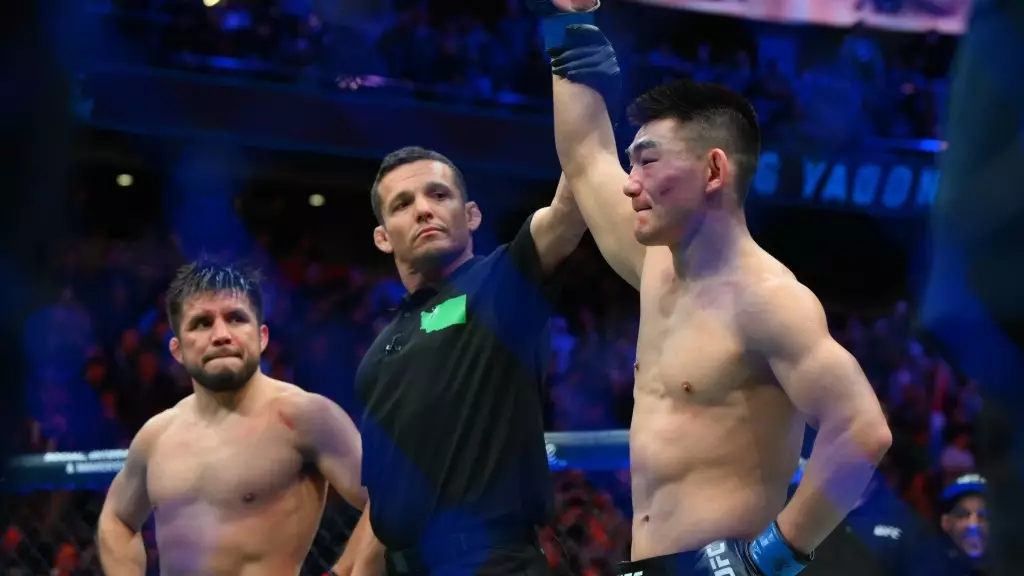The world of mixed martial arts is often rife with controversies that spark intense debates among fans, fighters, and officials alike. One such incident took center stage during the aftermath of Henry Cejudo’s loss to Song Yadong at UFC Fight Night 252. The disagreement revolved around an eye poke and the ensuing decisions made by referee Jason Herzog, raising significant questions about officiating in high-stakes bouts.
Henry Cejudo, a former UFC champion with an impressive record of 16-5, faced Song Yadong, who held a 22-8-1 record, in the main event at Climate Pledge Arena. The match had been hard-fought, but darkness descended on the contest when Cejudo suffered an eye poke in the final moments of Round 3. In accordance with established MMA protocol, he took a five-minute recovery period. However, upon resuming the fight, Cejudo revealed that his vision had still not returned to normal. He reported seeing “four arms,” a vivid testament to his compromised state.
Despite his troubling experience, the fight went to the judges’ scorecards, ultimately awarding Song a technical decision victory. The ramifications of this decision would linger far beyond the octagon, leading Cejudo to confront Herzog for what he believed was a failure to uphold the integrity of the rules.
Cejudo’s frustration boiled over when he took to social media to share his grievances against Herzog. According to Cejudo, the referee did not penalize Yadong for what he described as a “blatant” eye poke. “When I got poked, Jason, one, you didn’t take a point,” Cejudo asserted, emphasizing the importance of enforcing the rules consistently. His passionate appeal for greater accountability in officiating is indicative of a greater need for standardization across MMA events.
Herzog, who has gained recognition as a respected referee, offered a candid response during the discussion. He admitted the likelihood that he should have, indeed, taken a point from Yadong. While recognizing the fluid nature of officiating, Herzog’s willingness to accept responsibility reflects a broader challenge inherent in refereeing sports that involve such high stakes.
Cejudo articulated a valid concern regarding Herzog’s failure to act on the outstretched fingers of Yadong, particularly after the incident had already compromised Cejudo’s ability to compete effectively. “I looked like the biggest b*tch on earth… I have a loss on my record, Jason, because you didn’t make the right call,” Cejudo lamented. This sentiment touches on the psychological toll that perceived injustices can impose on fighters.
The implications extend beyond personal losses to the reputation of the sport as a whole. Failing to enforce rules can set a dangerous precedent, where fighters might question the integrity of officiating or, worse, place themselves in harm’s way due to inadequate protective measures. In this instance, Cejudo’s loss serves as a cautionary tale of the critical importance of strict adherence to rules, especially when they relate to fighter safety.
This controversy has reignited discussions regarding the need for enhanced referee training and accountability. As the sport of MMA grows in popularity, expectations surrounding officiating should also evolve. Referees like Herzog must be equipped not only with a comprehensive understanding of the rules but also the adaptability to make decisive calls under pressure.
Cejudo’s assertion that Herzog discussed rules with him before the match but then failed to enforce them creates a disconnect between pre-fight education and post-fight enforcement that must be rectified. The conversation between Cejudo and Herzog underscores the necessity of post-fight evaluations of officiating decisions—measures that could greatly benefit the sport and its future direction.
In the world of mixed martial arts, the line between victory and defeat is often razor-thin, frequently determined by a ref’s judgment call. The fallout from Cejudo’s bout against Yadong highlights glaring issues within officiating that require urgent attention. As fighters and fans call for clearer standards, it’s critical for the UFC and other promotions to examine their refereeing protocols closely. The sport’s integrity depends on officials who not only know the rules but are also empowered to enforce them decisively, creating a safer and fairer environment for athletes to compete. Moving forward, it is essential for the MMA community to address these concerns to protect the fundamental spirit of the sport.

